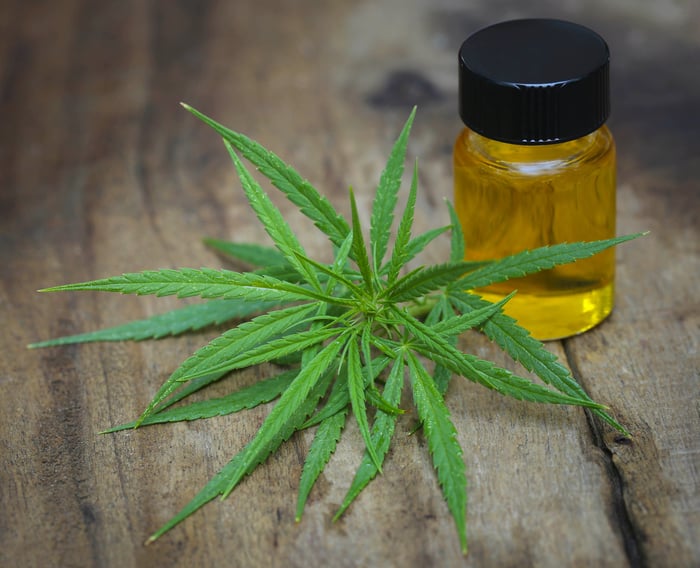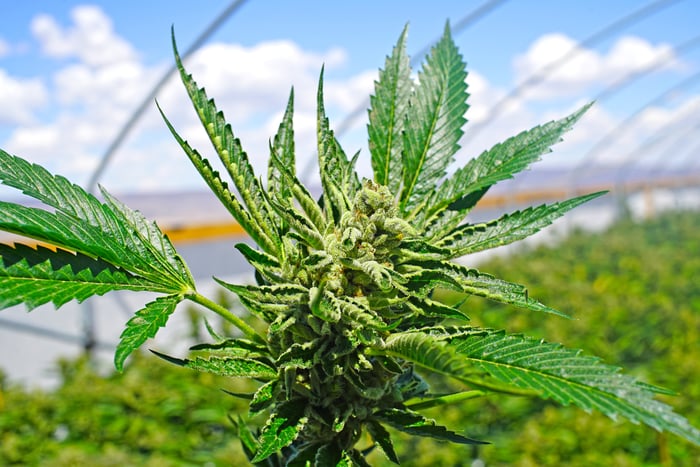Few industries have grown as quickly or consistently in recent years as marijuana stocks. Depending on your source, the cannabis industry could grow by an impressive 25% to 35% per year through 2021 --or beyond. This sales growth, aided by the expectation that Canada will legalize recreational pot by this summer, is a big reason why pot stock investors have piled into this industry recently.
But it's not just sales growth that has investors excited. It's the shift in consumer opinion toward cannabis. Within the U.S., no fewer than five national polls since April 2017 have demonstrated overwhelming support for legalization (often 59% to 64% support, depending on the survey). With the public so strongly behind the idea of legalization, investors expect sales growth throughout North America to continue climbing.

Image source: Getty Images.
The biggest publicly traded pot stocks
There is, however, an ever-growing list of marijuana stocks for investors to choose from. What had been a relatively small number of pot stocks has seemingly exploded to more than 100 equities in recent years. Today, we'll take a brief look at the 10 largest pure-play marijuana stocks by market cap (as of midday Tuesday, April 3). And by pure play, I mean excluding businesses, such as Scotts Miracle-Gro, that devote only a small percentage of their sales to cannabis.
1. Canopy Growth Corp: $4.36 billion
The king of all pot stocks, at least for the time being, is Canopy Growth Corp. (CGC -3.13%). Canopy currently has seven grow facilities spread across 665,000 square feet, and it is in the process of developing greenhouses on 3.7 million square feet of land in British Columbia. Though tight-lipped about its annual production capacity, it could easily top 300,000 kilograms of dried cannabis.
What really makes Canopy Growth special is its distribution channels. It has physical outlets to sell cannabis, an online presence complete with the most well-known brand in Canada (Tweed), and a partnership with spirits giant Constellation Brands, which took a 9.9% equity stake in Canopy last year worth $190 million. Canopy Growth also has a burgeoning presence in foreign markets where medical cannabis is legal. It's the most complete package, which is why it currently boasts the largest market cap.
2. Aurora Cannabis: $3.47 billion
Though it has given Canopy a run for its money, Aurora Cannabis (ACB -1.86%) has safely occupied the No. 2 spot in market cap for months. After acquiring CanniMed Therapeutics in the largest marijuana acquisition in history, the company is on track for 283,000 kilograms in fully-funded, fully ramped-up, annual production.
The bulk of Aurora's annual yield comes from its organically built Aurora Sky project, which should yield over 100,000 kilograms annually, as well as its partnered Aurora Nordic project in Denmark, which is expected to produce at least 120,000 kilograms of cannabis a year. Aurora's state-of-the-art facilities should boast some of the lowest per-gram costs in the industry.

Image source: GW Pharmaceuticals.
3. GW Pharmaceuticals: $3.13 billion
In terms of cannabinoid-based drug developers, GW Pharmaceuticals (GWPH) stands tall. Though it already has an approved drug throughout Europe known as Sativex, GW Pharmaceuticals' claim to fame looks to be experimental drug Epidiolex, a cannabidiol-based drug that's currently under review by the Food and Drug Administration (FDA) for use in the treatment of two rare forms of childhood-onset epilepsy.
In two pivotal-stage trials each for Dravet syndrome and Lennox-Gastaut syndrome -- neither of which have an FDA-approved treatment -- Epidiolex handily met the primary endpoint of a statistically significant reduction in seizure frequency from baseline. Though estimates vary, peak annual sales may top $500 million, if approved.
4. Aphria: $1.39 billion
Aphria (NASDAQOTH: APHQF) is yet another Canadian-based grower with a billion-dollar valuation. Following the acquisition of Nuuvera, the new Aphria is on track to produce approximately 230,000 kilograms of cannabis a year. This includes a four-phase expansion project that should yield 100,000 kilograms, along with a strategic partnership with Double Diamond Farms that'll produce 120,000 kilograms.
Interestingly, the acquisition of Nuuvera didn't really boost Aphria's annual production targets. However, it did push Aphria's access up to a dozen countries, including Canada. In other words, its Nuuvera buyout was a major step forward for the company's distribution channel.

Image source: Getty Images.
5. MedReleaf: $1.23 billion
The last of the billion-dollar pot stocks is MedReleaf (NASDAQOTH: MEDFF), a grower that has historically placed a strong emphasis on cannabis oil and extract production. Even though MedReleaf is only forecast to produce 140,000 kilograms of fully-funded cannabis a year, it could produce beefier margins than its peers as a result of its strong focus on higher margin oils and extracts.
MedReleaf's recent acquisition might be its most impressive. In a cash-and-stock deal, MedReleaf acquired 164 acres of land, 69 of which already had a growing facility (the Exeter facility) that could be retrofitted to cannabis production. Doing so, rather than building a greenhouse from the ground up, is a time- and money-saving venture.
6. Cronos Group: $982.7 million
Canadian investment firm Cronos Group (CRON -0.82%) really made waves in late February when it became the first pot stock to up list from the over-the-counter (OTC) exchange to the Nasdaq. Doing so is expected to improve visibility and make its stock more attractive to institutional investors who would otherwise not purchase stocks listed on the OTC exchange.
As for the underlying business, Cronos holds a 100% stake in cannabis growers Peace Naturals and Original BC and a 21.5% stake in Whistler Medical Marijuana. The company has smaller investments in other growers too. As is the case with practically every grower mentioned above, the expected legalization of recreational cannabis in Canada is what has pumped up Cronos' market cap.

Image source: Getty Images.
7. Hydropothecary Corporation: $504.3 million
When it comes to truly niche operators in the cannabis space, Hydropothecary Corp. is it. The Quebec-based company, which currently prides itself on medical cannabis production, has expansion plans in the works that'll result in 1.3 million square feet of land being used to grow 108,000 kilograms of cannabis per year.
But it's the company's focus on non-traditional cannabis products that has intrigued investors. Hydropthecary has focused on expanding its extracts, oils, and powder line (known as Decarb, a ready to consume marijuana powder), as well as on premium medical marijuana strains that cost almost double the average per-gram selling rate for average-quality cannabis strains.
8. CannTrust Holdings: $473.2 million
CannTrust Holdings is currently focusing its efforts on more than 40,000 actively registered medical patients. However, like every grower noted above, it's in the midst of a major expansion. CannTrust's 430,000 square foot Niagara Greenhouse remains on track and on budget to eventually produce 40,000 kilograms per year. Beyond that, the company expects to add another 600,000 square feet of capacity using a portion of the 36-acre vacant lot next to the Niagara Greenhouse.
Most important, CannTrust announced in its latest quarterly results that just over 64% of its sales were a result of extracts. Extracts are a significantly higher margin product relative to dried cannabis, lending to the belief that CannTrust could offer superior margins in the future.

Image source: Getty Images.
9. Cannabis Wheaton Income Corp.: $442.2 million
The ninth-biggest marijuana stock isn't a grower at all -- it's a royalty and streaming company known as Cannabis Wheaton Income. Since access to capital is a challenge for most pot stocks, Cannabis Wheaton steps in with the financing they need to expand capacity or their product lines. In return, Cannabis Wheaton receives a percentage of production at a below-market cost. It then turns around and sells what it receives from its licensed partners at the market rate and books the difference as a profit.
A company like Cannabis Wheaton offers immediate geographic and product-line diversity with its more than one dozen licensed partners, without the hassles of dealing with day-to-day cannabis growing expenditures. Of course, the downside is that streaming companies like Cannabis Wheaton have high initial costs, often resulting in shareholder dilution.
10. Emerald Health Therapeutics: $416.3 million
Rounding out the top 10 largest marijuana stocks is Emerald Health Therapeutics (EMHT.F). Emerald Health has big ambitions of placing itself among Canada's top growers by annual production, and it is currently in the process of building out two major projects that should push its annual yield over 100,000 kilograms.
The first involves a from-scratch build-out of 1 million square feet in British Columbia that'll house the company's headquarters. The second involves a strategic partnership with Village Farms International that'll see an existing 1.1 million square foot facility get retrofitted from tomato production to dried cannabis. This latter facility is expected to produce at least 75,000 kilograms annually when complete.





